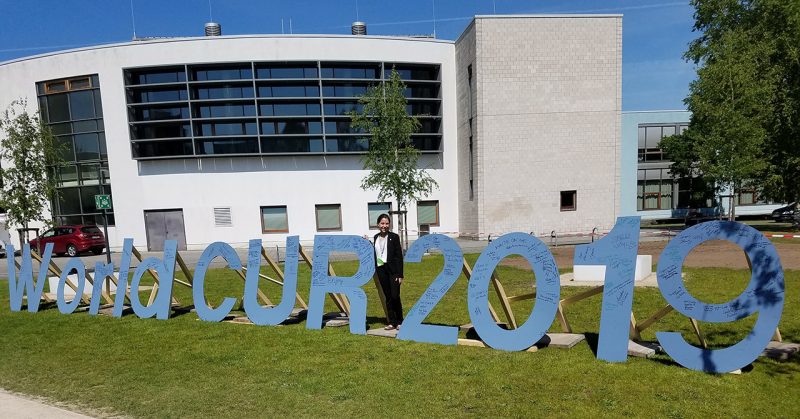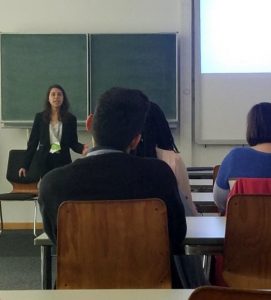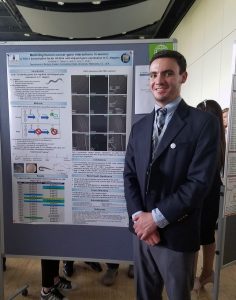- Apply
- Visit
- Request Info
- Give
2 Students Bring Eastern Research to the World Stage
Written by Michael Rouleau
Published on June 06, 2019
 Eastern Connecticut State University’s undergraduate research program gained stature this spring semester, as all three of its student applicants were accepted to present at the second annual World Conference on Undergraduate Research (WCUR) on May 23–25 in Oldenburg, Germany. Biology major Jonathan Rappi ’19 and Political Science major Cassidy Neri ’19 made the transatlantic journey; Psychology major Malvina Pietrzykowski ’19 was accepted, but unable to attend.
Eastern Connecticut State University’s undergraduate research program gained stature this spring semester, as all three of its student applicants were accepted to present at the second annual World Conference on Undergraduate Research (WCUR) on May 23–25 in Oldenburg, Germany. Biology major Jonathan Rappi ’19 and Political Science major Cassidy Neri ’19 made the transatlantic journey; Psychology major Malvina Pietrzykowski ’19 was accepted, but unable to attend.
“Presenting my research on an international stage was extremely interesting, given the relevance of my project,” said Neri, who presented on U.S.-Israeli foreign policy in a project titled “Pro-Israel PAC Expenditures and Candidate Decision Making.”

“Many who attended my session were from other countries,” continued Neri. “I was extremely nervous while giving my presentation. Due to the relevance of Israeli foreign policy on the world stage, many people took interest in what my point of view might be, coming from the United States.”
Neri’s research acknowledges the influence on the U.S. legislative process by special interest groups, which make campaign donations through Political Action Committees (PACs). “The purpose of this project is to better understand the effect of PAC donations on legislative votes,” reads her abstract. “This research specifically attempts to determine the effect of PAC donations from Pro-Israel organizations on U.S. Senate decision making.”
Mentored by Political Science Professor Nicole Krassas, Neri collected years of data concerning Pro-Israel campaign contributions, Senate roll-call votes, state demographics and more.
Neri asserts that Pro-Israel groups have influenced U.S. foreign policy for years under the broad umbrella of the American Israeli Public Affairs Committee (AIPAC). Because of the amount of foreign aid funding that the United States provides, she says “it is clear that Pro-Israel groups have a stake in the outcome of Congressional decisions.”
Despite the nervous start, Neri finished her presentation strong and received praise for her findings. She concluded: “I’ve walked away with an extreme appreciation for undergraduate research, including the effort it takes to be accepted to a conference such as WCUR.”
Rappi’s research concerned cancer treatment in a presentation titled “Modeling Human Cancer Gene Interactions in Worms: A Fos-1 Transcription Factor Inhibits Odd-Skipped Gene Expression in C. Elegans.” He was mentored by Biology Professor Amy Groth.

“My presentation was well received,” he said. “Even afterward, I had people coming up to me asking for more information. I’m glad I was able to show the world some of the high-quality research done at Eastern and in the biology department.”
Rappi’s abstract reads: “Cancer, particularly lung cancer, is one of the leading causes of death in the world, yet much remains unknown about this disease.” He notes that human odd-skipped genes (Osr1 and Osr2) are important for tissue development and cancer prevention, yet they are poorly studied.
Decreased expression of Osr1 has been found to increase risk of cancer, therefore he says, “Identification of genes that regulate Osr1 expression will provide important information about how cancer develops.”
Rappi utilized a microscopic worm called “C. elegans” to study odd expression — worms have two odd genes (odd-1 and odd-2). Odd-2 is most closely related to the two human genes (Osr1 and Osr2), and is structurally most similar to Osr1. From 23 genes tested, Rappi identified several that changed odd gene expression, including fos-1.
His abstract concludes: “Because the human Fos genes lead to cancer development, and Osr1 prevents cancer development, these experiments could eventually lead to a novel diagnostic test or therapeutic target that could improve lung cancer detection and treatment.”
Reflecting on the conference, Rappi said: “Presenting on an international stage was truly a unique experience. I had the opportunity to talk to many people from all over the world about important global issues. Each person had a different background and culture, yet we were all united by a passion for research.”
Countries represented at WCUR included Germany, Canada, Qatar, Australia, Argentina, Cambodia, Egypt and more. Submissions were reviewed by the WCUR program committee as well as two international faculty—one being an expert in the topic area of the submission. Students were admitted if their abstract demonstrated a unique contribution to their field.
“To have all submissions accepted was the exception, not the rule for most universities,” said Carlos Escoto, director of Eastern’s undergraduate research program. “This speaks to the quality of work that faculty are able to mentor students through.”


